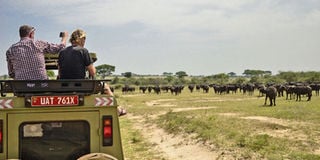Tourism sector booming — government

Tour. Tourists enjoy a game drive at Murchison Falls National Park in 2015. The figures contained in the Tourism sector manifesto implementation progress show more growth of the sector in terms of revenue. PHOTO BY ERIC DOMINIC BUKENYA
What you need to know:
- Tourism ministry said while the sector continued to make positive strides, low levels of product development to keep the tourists much longer and spend more has been one of the biggest obstacles.
- On the wildlife conservation, the minister said Uganda Wildlife has made tremendous achievements in combating poaching and wildlife trafficking.
Kampala. Uganda’s tourism sector has continued to generate more revenue than all other sectors, posting $1.63b (Shs6.1 trillion) in 2018, up from $1.4b (Shs5.2 trillion) in 2017.
The country also witnessed increased tourism numbers, registering 734,388 visitors, up from 622,295 in 2017.
The figures are contained in the tourism sector manifesto implementation progress presented by the Minister of Tourism, Wildlife and Antiquities, Prof Ephraim Kamuntu, yesterday at the Uganda Media Centre.
Govt funding
The minister attributed the rise in numbers and revenue to the sustained marketing of Uganda as a preferred destination. He said over the years, government has continued to provide more funds to the sector to market the country.
“Government provided funding for sustained engagement of market destination representation firms and market activations in the targeted markets. Six firms were deployed in the core markets and the emerging source markets,” Prof Kamuntu said.
He said the sustained marketing has led to increased number of leisure visitors from the American market by 10 per cent annually since 2016 and improved image of Uganda in these key markets.
He also said over the same period, visitation to national parks and other selected tourist sites increased by more than 10 per cent annually.
Prof Kamuntu said rebranding the Pearl of Africa has began with the procurement of a consultant to develop the Uganda Destination Brand.
“We expect to launch the brand by end of 2019. UTB has embarked on running promotional videos and actively engaged national conference and event organisers to provide pre, during and post event promotional packages. Additionally, UTB is programmed to make tourism presentations at the major conferences such as the International Coffee Conference, The World Customs Conference, and Rotary Conferences,” he said.
On the wildlife conservation, the minister said Uganda Wildlife has made tremendous achievements in combating poaching and wildlife trafficking. He said more than 210 suspects have been arrested and arraigned in the courts of law over wildlife trafficking.
“The deployment of both intelligence and canine teams at the airport has seen a decrease in use of Entebbe International Airport as wildlife and wildlife products trafficking hub,” he added.
He said intelligence led operations with police, Natural Resources Conservation Network, army, Uganda Revenue Authority and other agencies have been conducted.
“More than 210 suspects were arrested with a number of wildlife and wildlife products. All arrested suspects were presented to courts of law and many were convicted. Government has established a Wildlife and Utilities Court as an effort to speed up prosecution,” he said.
On the encroachment and boundary management of the park, he said complete survey and boundary marking for Mt Elgon National Park was done, with 656 pillars erected in five districts of Bududa, Bukwo, Bulambuli, Kapchorwa and Kween.
He also said a total of 3,063kms of protected area boundary maintained and 25kms planted with live markers and 121 pillars were constructed in protected areas.
On the revenue sharing, Prof Kamuntu said communities around the national parks and wildlife reserves benefited from the proceeds from the parks through the revenue- sharing agreement.
Challenges
Tourism ministry said while the sector continued to make positive strides, low levels of product development to keep the tourists much longer and spend more has been one of the biggest obstacles.
Prof Kamuntu also said the multiple licensing frameworks and taxes has had negative impact of making tourism business less competitive.




